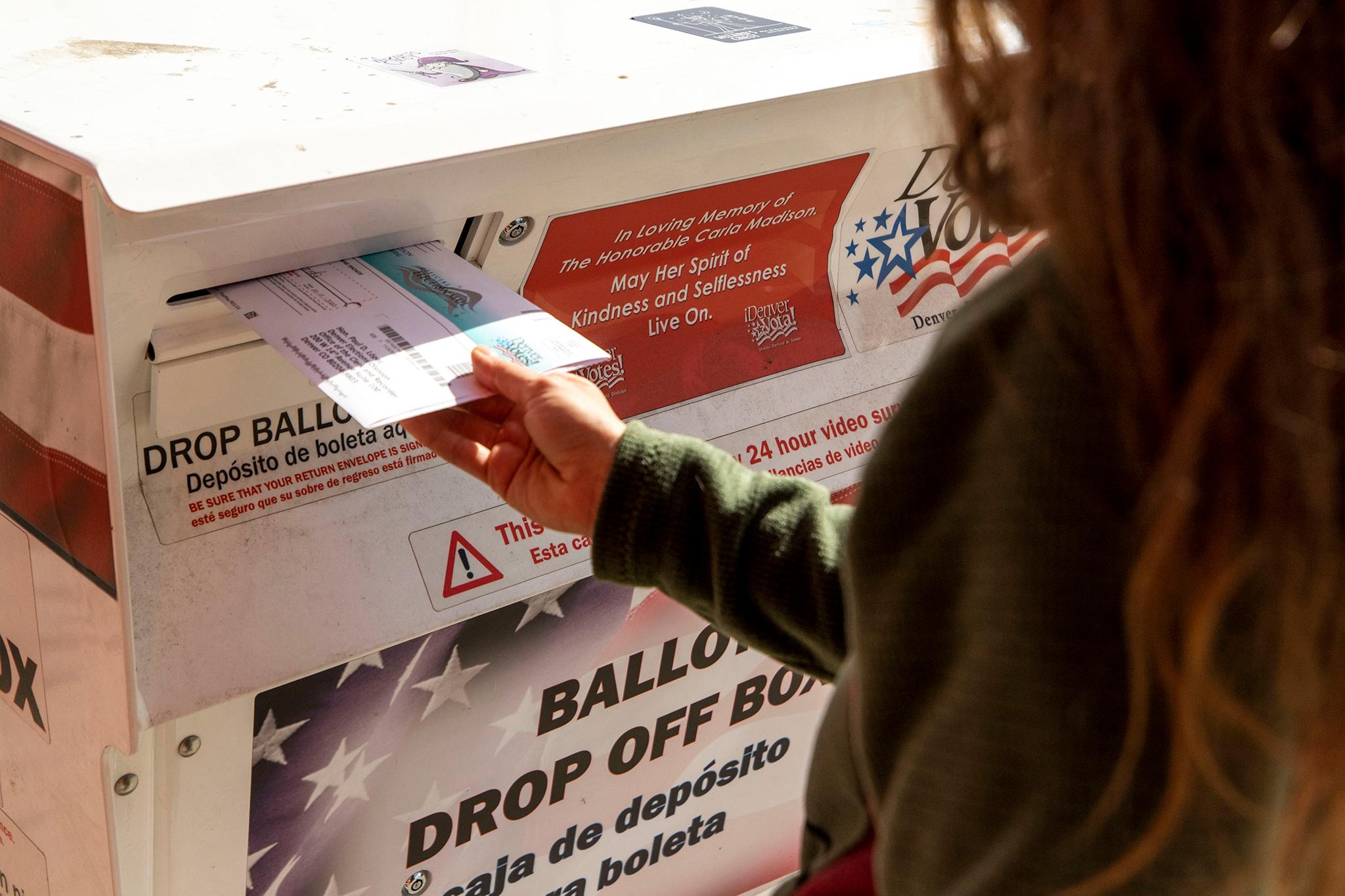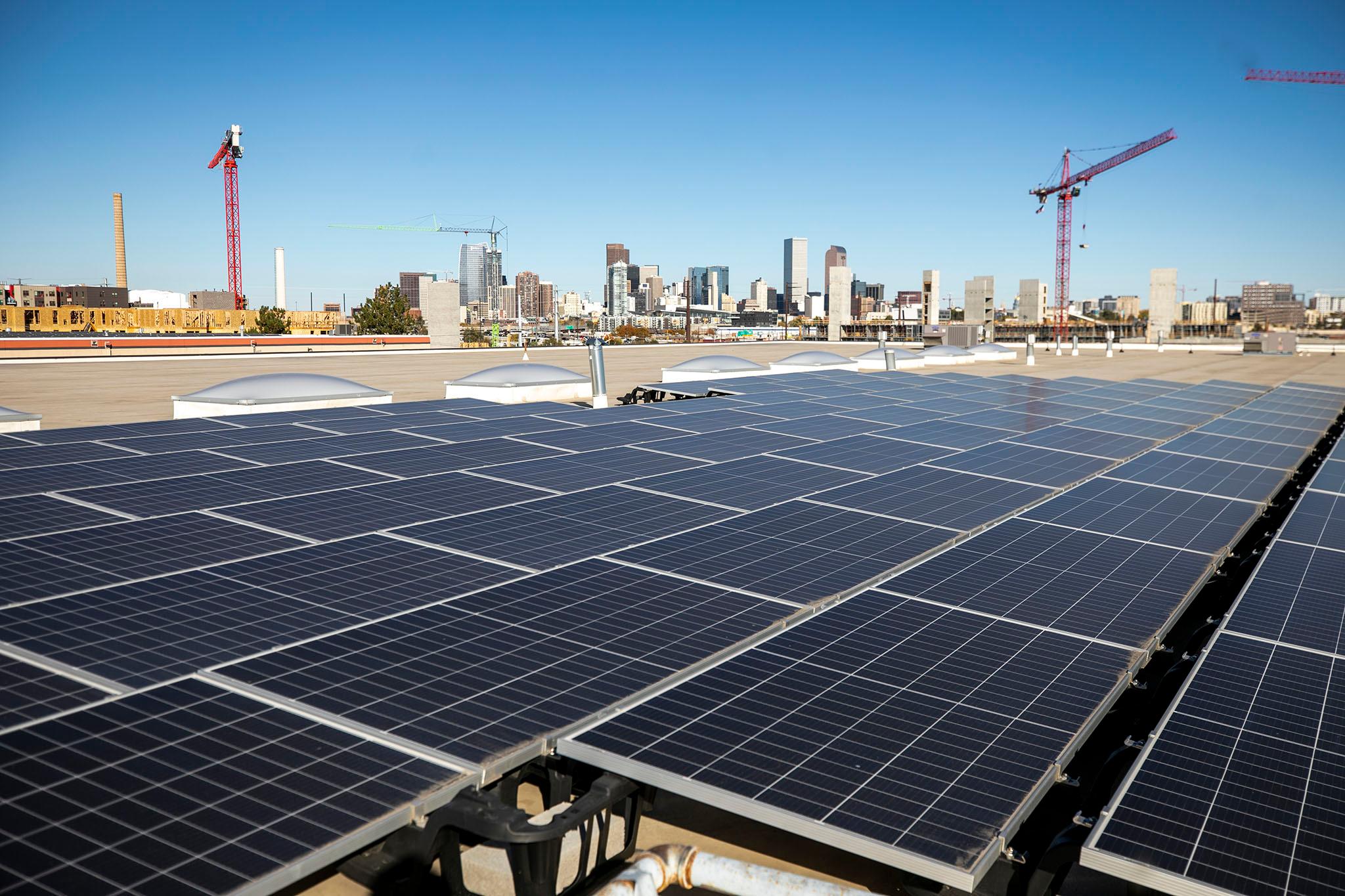
Updated at 1:15 p.m. on Monday, March 4, 2024.
Jump to: Election FAQs | Ballot Questions
Colorado’s 2024 presidential primary is March 5, known as Super Tuesday for the large number of states all holding their own elections on the same day.
On this day, Colorado voters will only have to make one decision: who they want their presidential candidate to be in the November general election. While only having one contest may seem like a simple choice to make, it can get confusing if you’re an unaffiliated voter or if candidates you thought dropped out of the race are showing up on your ballot.
But before we break down the basics surrounding your ballot, here are some important dates and answers to common questions you may have.
Important presidential primary dates:
Feb. 12
- This is the last day voters affiliated with a political party (such as Democrats or Republicans) can change or withdraw their affiliation if they wish to vote in a different party’s presidential primary.
- This is the first day that ballots for the presidential primary may be mailed to voters.
Feb. 26
- This is the last day to submit a voter registration form in order to receive a ballot in the mail for the presidential primary.
March 5
- Election Day. You must cast your vote or drop off your ballot by 7 p.m. Results will start being released shortly after that.
March 15
- By this day, counties must finish counting all in-person and absentee ballots and generate a results report.
Election FAQs
How do I register to vote?
You have options! You can register online here or complete this registration form and either email it to your county clerk and recorder or mail it to the Department of State.
Colorado also allows people to register and vote up until 7 p.m. on Election Day when polls close. You’ll need to register in person at a polling place where you’ll then get a ballot and be able to vote. Find more information here.
How do I check my registration status, including my party affiliation and address?
You can check and edit your registration status on the Secretary of State’s website here, just provide your first and last name, Zip code and birthday. Once in, you can find your voter ID, registration status, party affiliation, residential address, ballot information and in-person voting locations.
Why am I getting an absentee ballot? I want to vote in person.
Colorado mails ballots to all registered, active voters in the state (with one exception for this contest that we’ll get to below). Inactive voters have to update their registration information in order to get a mail ballot. If you want to vote in person, you can throw away your ballot and vote at a polling center instead.
I belong to a minor party. Will I get a ballot for this election?
Not this time. None of the state’s minor parties have contested primaries. If you want to participate in the presidential primary, you would need to change your registration by Feb. 12 in order to vote in either the Democratic or Republican primary.
How do I return my ballot?
Colorado allows voters to return their ballots multiple ways. If you mail it in, you’ll need to add postage and send it back no closer than a week out from the election to ensure it gets to your clerk’s office in time.
If you want to drop it off, you have more than 350 dropboxes available around the state to put your ballot in. You can find them here. Some counties, like Denver, also have drive-through drop-offs where you can hand your ballot to an election judge. If you do accidentally drop off your ballot in the wrong county, the clerk there will try to get it back where it belongs.
What if I damaged my ballot?
If you damaged your ballot you can request a replacement mail ballot from your county clerk or vote in person at a polling place.
Do I need to show identification to vote?
Yes. Voters who vote at the polls must bring identification. You may also need to provide a photocopy of your identification along with your mail ballot, if you are voting by mail for the first time. Find acceptable forms of identification from the Secretary of State here.
How can I keep track of my ballot?
Colorado uses a service called BallotTrax that allows voters to sign up for text or email alerts at each stage of the voting process. The messages will let you know when your ballot has been mailed to you, when it’s received back at the clerk’s office, and when it’s been processed.
You can enroll here.
Who’s on the presidential primary ballot?
Only presidential candidates for the two major parties will be on the primary ballot. That means voters registered with a minor party will not receive a ballot. Here are the Democratic and Republican candidates you may see on your ballot, with notes to signify which candidates have dropped out.
Registered Democrats will see these candidate names on their March 5 ballot:
- Jason Michael Palmer
- Gabriel Cornejo
- Frankie Lozada
- Dean Phillips
- Stephen P Lyons
- Marianne Williamson | Note: Marianne Williamson dropped out of the presidential race on Feb. 7.
- Joseph R Biden Jr
- Armando "Mando" Perez-Serrato
- Noncommitted delegate*
*From the Secretary of State’s office: The Colorado Democratic Party submitted a request for a "Noncommitted delegate" to appear on the 2024 Presidential Primary Ballot under the provisions of Colorado Revised Statutes 1-4-1204(3). Per statute, a vote for the Noncommitted delegate provides "a place on the primary ballot for electors who have no presidential candidate preference to register a vote to send a noncommitted delegate to the political party’s national convention.
Registered Republicans will see these candidate names on their March 5 ballot:
- Vivek Ramaswamy | Note: Ramaswamy dropped out of the presidential race on Jan. 15 after the Iowa caucuses.
- Asa Hutchinson | Note: Hutchinson dropped out of the presidential race on Jan. 15 after the Iowa caucuses.
- Nikki Haley
- Ron DeSantis | Note: DeSantis dropped out of the presidential race on Jan. 21 just before the New Hampshire primary.
- Chris Christie | Note: Christie dropped out of the presidential race on Jan. 10.
- Ryan L Binkley
- Donald J. Trump**
- Rachel Hannah "Mohawk" Swift
- Walter Iwachiw
**From the Secretary of State’s office: The U.S. Supreme Court has agreed to hear arguments to the Colorado Supreme Court’s decision that Donald Trump is ineligible to appear on the Colorado Presidential Primary ballot. His name will appear on the 2024 Presidential Primary ballot as a result.
- U.S. Supreme Court shoots down Trump eligibility case from Colorado
- Will votes for Trump count in Colorado’s upcoming presidential primary?
- The Colorado Supreme Court just ruled against Trump. Here’s what might happen next for voters
- In U.S. Supreme Court hearing, justices question legal ground for removal of Trump from Colorado primary ballot
- The Colorado Supreme Court just ruled against Trump. Here’s what might happen next for voters
I’m an unaffiliated voter and got two ballots. What do I do?
Unaffiliated voters will receive two ballots, one Democratic and one Republican. But you should only vote and return one, and then securely dispose of the unused ballot. If you return two ballots in the same envelope then neither of the ballots will count. This option was approved by voters in 2016.
Which party’s primary you chose to participate in is a matter of public record, but not how you vote.
I’m a Democratic voter. What does this “noncommitted delegate” option on my ballot mean?
Basically, it means you are choosing “none of the above.”
Colorado’s Democratic Party asked the state to include this option. If enough people select it, then some of the state’s 87 delegates to the Democratic National Convention will be free to vote for whichever candidate they want, instead of being bound to support a specific one.
What if I vote for a candidate who already dropped from a race?
The short answer is your vote no longer counts. That goes for candidates who drop out after you return your ballot but before the primary date, too. And no, you cannot receive another ballot.
I want to vote for Donald Trump. Will my vote count?
Yes. The U.S. Supreme Court has overturned the state supreme court’s ruling that Trump is ineligible to run for office in Colorado. To be on the safe side, the court had ordered that his name be printed on GOP primary ballot. With this ruling, all votes for Trump will count.
Still have questions? Check out this FAQ from the Secretary of State’s office.
Editor's note: This story was updated to reflect Marianne Williamson dropped out of the presidential race and that the U.S. Supreme Court has overturned the state supreme court's ruling.









